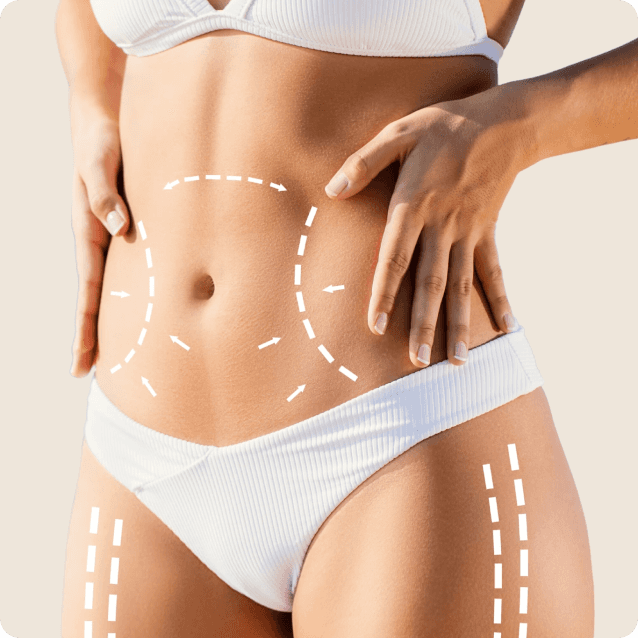Liposculpture
What is a Liposculpture?
Liposculpture is a modern evolution of traditional liposuction, offering a more refined approach to body contouring. While liposuction primarily focuses on the removal of unwanted fat from specific areas, liposculpture takes it a step further by not only removing fat but also strategically redistributing it to enhance the body's natural curves. This dual-action process involves sculpting the body by eliminating fat from areas where it's excessive and then carefully transferring it to areas that could benefit from added volume, such as the buttocks, hips, or face. The result is a more harmonious and balanced physique, tailored to the individual's desired aesthetic.
What to do before a liposculpture?
Do's:
Consult with a Qualified Surgeon: Ensure your surgeon is board-certified and experienced in liposculpture. Discuss your expectations and any health conditions.
Maintain a Healthy Diet: Eat a balanced diet rich in vitamins and nutrients to prepare your body for surgery and promote healing.
Stay Hydrated: Drink plenty of water in the weeks leading up to the procedure to keep your body well-hydrated.
Avoid Smoking and Alcohol: Stop smoking and avoid alcohol at least 2-4 weeks before surgery, as both can impede healing and increase the risk of complications.
Arrange for Post-Surgery Support: Plan for someone to drive you home after the procedure and assist you during the initial recovery period.
Don'ts:
Don’t Take Blood Thinners: Avoid aspirin, ibuprofen, and other blood-thinning medications for at least two weeks before surgery to reduce the risk of excessive bleeding.
Don’t Undergo the Procedure If You're Not in Good Health: If you have any underlying health issues, discuss them with your surgeon before scheduling surgery.
Don’t Eat or Drink 8 Hours Before Surgery: Follow your surgeon’s instructions regarding fasting before the procedure.
Don’t Use Topical Skincare Products: Avoid applying lotions, creams, or any skincare products to the areas being treated at least 24 hours before surgery.
Don’t Forget to Arrange for Time Off Work: Plan for sufficient time off work to recover properly.
What to do after a liposculpture?
Do's:
Follow Post-Operative Instructions: Adhere to all instructions provided by your surgeon, including taking prescribed medications and attending follow-up appointments.
Wear Compression Garments: Wear the recommended compression garments as instructed to reduce swelling and help your body adapt to its new shape.
Stay Active (Gently): Engage in light walking as soon as possible to promote circulation and reduce the risk of blood clots.
Maintain a Healthy Diet: Continue eating a balanced diet to support healing and maintain your results.
Keep Hydrated: Drink plenty of water to flush out toxins and reduce swelling.
Don'ts:
Don’t Engage in Strenuous Activity: Avoid heavy lifting, vigorous exercise, and other strenuous activities for at least 4-6 weeks post-surgery.
Don’t Smoke or Drink Alcohol: Refrain from smoking and drinking alcohol for several weeks after surgery to avoid complications and support the healing process.
Don’t Expose Treated Areas to Sunlight: Protect your skin from direct sunlight to prevent hyperpigmentation and protect healing incisions.
Don’t Ignore Signs of Complications: Contact your surgeon immediately if you experience excessive pain, unusual swelling, or signs of infection.
Don’t Rush the Healing Process: Give your body time to heal, and be patient with your recovery.
Who is the best candidate for a liposculpture?
The best candidates for liposculpture are individuals who:
Are in Good Overall Health: Candidates should be non-smokers with no significant medical conditions that could impair healing or increase surgical risks.
Have Realistic Expectations: Ideal candidates have a clear understanding of what liposculpture can achieve and are realistic about the outcomes.
Are Close to Their Ideal Weight: Liposculpture is not a weight-loss procedure. Candidates should be near their target weight, with localized fat deposits they wish to address.
Have Good Skin Elasticity: Those with firm, elastic skin will experience the best results, as their skin can better adapt to the new contours after fat removal.
Desire Body Contouring: Candidates are those looking to refine their body shape, rather than simply remove fat, and are interested in a more sculpted, proportional appearance.




